Classic Commentaries and Studies on Ephesians (23 vols.)
Digital Logos Edition
Overview
This massive twenty-three volume collection features a variety of the most notable classic studies on Ephesians from the nineteenth and twentieth centuries. With scholars such as Charles Gore, Arthur Pridgam, and Paul Bayne, Classic Commentaries and Studies on Ephesians offers over 8,000 pages of interpretation, observations, translations, contextual history, and application on this important Pauline Epistle. The twenty-three volumes contained in Classic Commentaries and Studies on Ephesians have had an enduring impact on New Testament exegesis, and this exceptional collection provides easy accessibility to this wealth of significant scholarship.
This collection is essential for students, scholars, pastors, historians, teachers of the Bible, or anyone studying the book of Ephesians. With Logos Bible Software, this collection is completely searchable, with passages of Scripture appearing on mouse-over, as well as being linked to the Greek and English translations in your library. This makes these texts more powerful and easier to access than ever before for scholarly work or personal Bible study. With the advanced search features of Logos Bible Software, you can perform powerful searches by topic or Scripture reference—finding, for example, every mention of “marriage,” or “Ephesians 3:14.”

- Over eight-thousand pages of notable scholarship on Ephesians
- Noted authors from a wide variety of backgrounds
- Completely searchable, linked to your preferred Bible translation and the other books in your library
- Title: Classic Commentaries and Studies on Ephesians
- Volumes: 23
- Pages: 8,210
- St. Paul's Epistle to the Ephesians: A Practical Exposition by Charles Gore
- Studies in Ephesians, 1892 by A. R. Cocke
- Lectures on St. Paul's Epistle to the Ephesians by W. M. Graham
- The Epistle to the Ephesians in Greek and English, with an Analysis and Exegetical Commentary by Samuel H. Turner
- Expository Lectures on the Epistle to the Ephesians by Robert J. M'Ghee
- A Devout Commentary on the Epistle to the Ephesians Drawn Chiefly from the Works of St. Thomas Aquinas of the Order of St. Dominic by A. Bertand Wilberforce
- Notes and Reflections on the Epistle to the Ephesians by Arthur Pridgam
- A Commentary, Explanatory, Doctrinal, and Practical, on the Epistle to the Ephesians by R. E. Pattison
- An Exposition of the Epistle to the Ephesians in a Series of Discourses by Joseph Lathrop
- An Entire Commentary upon the Whole Epistle of St. Paul to the Ephesians by Paul Bayne
- Christian Solitude: As Exemplified in the Third Chapter of the Epistle to the Ephesians by James Harington Evans
- The Epistle to the Ephesians by Joseph Parker
- The Epistle of Paul to the Ephesians with Introduction and Notes by James S. Candlish
- The Epistle to the Ephesians: Its Doctrine and Ethics by R. W. Dale
- Expository Discourses on the Epistle to the Ephesians by D. B. Cameron
- Transplanted Truths, Or, Expositions of Great Texts in Ephesians by Alvah Sabin Hobart
- Commentary on St. Paul's Epistle to the Ephesians by Herbert G. Miller
- A Practical Exposition of the Epistle to the Ephesians in a Series of Lectures by William Neil
- The Soldier of the Cross: A Practical Exposition of Ephesians 10–18 by John Leyburn
- Christ and His Seed: Central to All Things: Being a Series of Expository Discourses in Paul's Epistle to the Ephesians by John Pulsford
- The Pastor's Prayer for the People's Weal: A Practical Exposition of St. Paul's Prayer for the Ephesians by James Spence
- The Epistle to the Ephesians: An Encyclical of St. Paul by George S. Hitchcock
- A Practical and Exegetical Commentary on the Epistle of St. Paul to the Ephesians by Henry Newland
This title is included in the following collections
You can save when you purchase this product as part of a collection.
Logos 8 Collector's Edition Le...
$11,399.99$11,399.99Logos 9 Collector's Edition Le...
$11,399.99$11,399.99Logos 8 Ultimate Legacy Librar...
$21,749.99$21,749.99Logos 9 Ultimate Legacy Librar...
$24,999.99$24,999.99
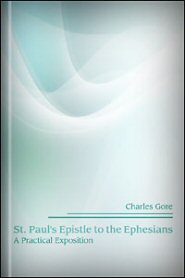
In his work St. Paul's Epistle to the Ephesians, Charles Gore explores the direct connection between moral values expressed in Ephesians with the doctrines of the Church of England. Gore employs analagous tropes, thorough explanation, and historical comparison to provide a crucial exposition of the book of Ephesians.
This volume may do a good deal to help readers to use and understand the Bible, and to see the practical value of theology in its bearing on life.
—The Church Quarterly Review
Charles Gore (1853–1932) was educated at Harrow School and the University of Oxford. Gore later became fellow at Trinity College, Oxford and vice-principal at Cuddesdon Theological College. He later became the Bishop of Worcester, the Bishop of Birmingham, and the Bishop of Oxford. Charles Gore published over fifteen volumes of works including The Church and the Ministry, St. Paul's Epistle to the Romans: A Practical Exposition (2 vols.), and The Body of Christ
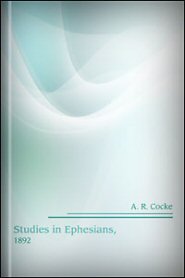
Moving verse-by-verse, A. R. Cocke provides concise studies on Ephesians through ample description, clarification, and annotation of the text. Cocke covers crucial elements of doctrine found in Ephesians, while following the text for clarity.
We most heartily congratulate the author on the great merit of his work, and feel sure that it is but the first-fruits of what he may be expected to do for the church whereever his post of service may find him.
—Francis R. Beattie, The Presbyterian Quarterly
This brief compend of many commentaries is an attempt to unite "the goodness of Elliot, the acuteness of Meyer, the spirituality of Derby, and the orthodoxy of Calvin": in a blended impression.—Book News Monthly
A. R. Cocke was pastor at Southern Presbyterian in Waynesbro, VA and Chair of Theology at Southwestern Presbyterian University.
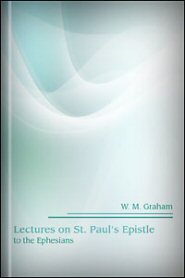
In Lectures on St. Paul's Epistle to the Ephesians, Graham provides extensive analysis of themes found in the book of Ephesians. He moves section-by-section providing semantic inference, rhetorical clarification, and explanation of the text in historical context.
An excellent practical commentary, full of devout thoughts and practical reflection.
—C. A. Briggs, The Presbyterian Review
W. M. Graham (1810–1883) was educated at Belfast Academical Institution before becoming the Minister of Dundonald Presbyterian Church.
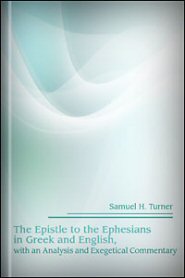
Written for both scholars and laity alike, Samuel H. Turner provides a critical commentary on Ephesians that compares the original Greek with the English translations, as well as coherent explanation of the text.
This work, without the parade of learning, gives the result of much learned investigation, not omitting the processes of reasoning, by which those results have been reached. It is adapted alike for the use of those who can and those who cannot read the New Testament in the original, though, of course, the critical remarks can only be fully appreciated by those who are acquainted with New Testament Greek.
—Church Register
The present colume contains the Epistle in the original, or according to the Greek text of Hahn, with the translation in the double column, and the notes below. Prefixed we have an introduction, followed by the masterly analysis of the design, process, and argument of the Epistle. No intelligent Christian should be without this work.
—Protestant Churchman
Samuel H. Turner (1790–1861) was Professor of Biblical Interpretation at General Theological Seminary of the Protestant Episcopal Church.
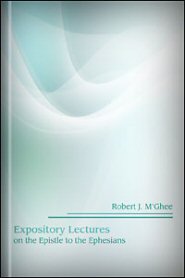
Originally preached as a series of sermons, M'Ghee provides practical explanation and exposition of the text through a series of fifty-two critical lectures. M'Ghee moves verse-by-verse through practical application while drawing upon hermeneutics to clarify the intent of the passage.
It is a rich and instructive exposition of one of the most comprehensive epistles of the New Testament. It is not designed or offered as a formal commentary on Ephesians, but rather as a plain, unadorned, familiar, and practical exposition of it. The author adheres with the closest simplicity to the letter of the text, and seeks to develop its true meaning, and give it a wise and faithful application.
—The Biblical Repository and Classical Review
Instead of a philological commentary, in which the writer simply states the import of the text, Mr. M'Ghee presents in their work a plain, full, and practical exhibition of all the various topics of which the epistle treats, and illustrates and confirms his views of them by the collateral passages of the New Testament.
—The Theological and Literary Journal
Robert J. M'Ghee (1789–1872) was Minister of Harold's Cross Church in Dublin and Rector of Holywell in Needingworth, Hunts.
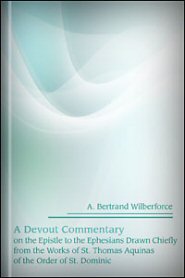
Dividing his commentary into two distinct sections—Doctrines and Exhortations found in Ephesians—Wilberforce engages his readers through extensive annotations and clarification of the text, using Thomas Aquinas as a doctrinal guide. After a generous introduction, Wilberforce moves expositionally chapter-by-chapter.
A. Bertrand Wilberforce was ordained in 1864 before becoming Prior of St. Dominic's in London. He later became a minister and chaplain to the Dominic nuns at Stone, UK.
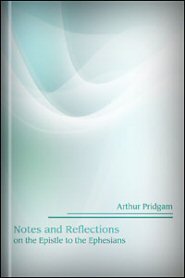
Articulating the distinctive exhortations of Ephesians, Arthur Pridgam walks through the text on a chapter-to-chapter basis. Pridgam offers extensive notes that provide instructive analysis of the text.
Mr. Pridham is a careful writer, and eminently evangelical. We believe that the judicious and spiritual reader will find this volume very helpful in the study of the remarkable Epistle on which it is writen.
—Eclectic Review
Mr. Pridham is well acquainted with the original Scriptures, and his critical explanation of many obscure passages will repay the most careful attention.
—Primitive Church Magazine
Arthur Pridham is the author of numerous biblical commentaries, including Notes and Reflections on Romans, Notes and Reflections on the Epistle to the Hebrews, Notes and Reflections on the Epistle to the Ephesians, and more.
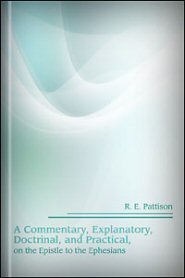
Divided into doctrinal rhetoric and application of inherent duty, Pattison's A Commentary, Explanatory, Doctrinal, and Practical, on the Epistle to the Ephesians endows the reader with critical explanation of the intended exhortation of Ephesians. Pattison covers topics such as the moral condition of the Ephesians, the scope of spiritual gifts, duties within marriage, and more!
We have examined this commentary, and have been highly gratified with its candid and evangelical spirit, its many judicious and sound remarks.
—Bibliotheca Sacra and Theological Review
R. E. Pattison (1800–1874) was educated at Amherst Collegem, MA. Ordained in 1829 as a Baptist minister, he became President of Waterville College from 1836–1840. Pattison later became president of the Western Baptist Theological Institute, before accepting the Chair of Systematic Theology at Newton Theological Seminary. .
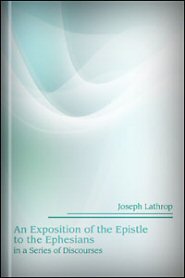
Transposed from an original series of sermons, this commentary from Joseph Lathrop provides extensive studies derived from the book of Ephesians. Lathrop's 50 discourses reflect on key passages, the intentions of Paul, and the call to action provided to the Ephesians.
Eminently worthy of a place in the library of every minister and of every layman too. It is replete with able, judicious, convincing and impressive views of divine truth. It is at the same time so lucrid and so practical that the most unlearned as well as the most learned may derive great advantage from its study.
—A Thesaurus of the Best Theological, Historical, and Biographical Literature, Cyrus F. Tibbals
Joseph Lathrop (1731-1821) was educated at Yale and Harvard before being ordained to pastor the Church at West Sprinfield, MA for sixty-two years. Lathrop turned down the position of Professor of Divinity at Yale University in order to continue pastoral care.
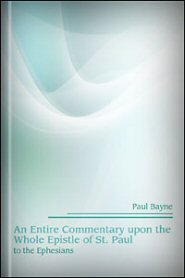
In this commentary on Ephesians, Baynes covers the character of Christ, grace and redemption, doctrines of the church, troubles of the Church at Ephesus, and exhortations of Paul. Each chapter and verse of Ephesians is closely examined, and Baynes offers practical application for the everyday Christian.
This addition to the handsome series of Commentaries, appears to be ably edited by Rev. Thomas Alexander, and leaves nothing to be desired to make it as complete as its predecessors.
—The Eclectic Review
Paul Baynes (1573–1617) was educated at Wethersfield before being elected Fellow of Christ's College at Cambridge in 1600.
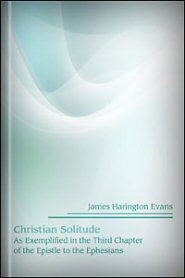
Taken from a course of sermons on Ephesians, the author lays a foundational framework of doctrine and key elements found in the third chapter of the epistle. Evans emphasizes the transformation of lifestyle after grace is received, and the manifestation of ultimate purpose.
To many, this book will prove valuable; it is so simple, so earnest, so evangelical.
—Christian Weekly News
[It is] highly valued by many who heard the substance of it from the pulpit. It is simple, experimental, and Christian in spirit and design.
—The Evangelical Magazine and Missionary Chronicle
James Harington Evans (1785–1849) was educated at Wadham College, Oxford before being ordained into the Church of England. He pastored John Street Baptist Chapel in London from 1815 till death.
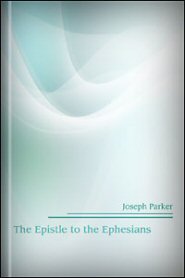
In this inquisitive volume, Joseph Parker examines the concept of the "church" as displayed by Christ in the book of Ephesians. Parker seeks to remove denominational inequalities from the defined purpose of the church.
Jospeh Parker (1830–1902) was educated at University College London before pastoring at Banbury. Parker published many works including City Temple Sermons, The People's Bible (25 vols.), and The Inner Life of Christ.
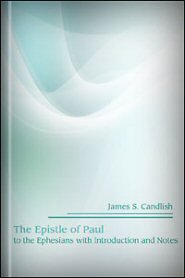
Moving verse-by-verse, Candlish provides insightful exposition of the text through semantic and colloquial interpretation, comparison with other New Testament doctrines, and application of historical context. Candlish compares consistencies between Ephesians and other New Testament books in order to draw upon parallel principles that are uniformly found throughout the entire Bible.
If any student or preacher should desire a concise, thorough, and learned hand-book on the Epistle to the Ephesians, we commend Dr. Candlish's little book to him. It is a treasury of compressed and condensed learning, wisdom, and piety.
—The Literary World
James S. Candlish D. D. was Professor of Theology at the Free Church College in Glasgow, Scotland.
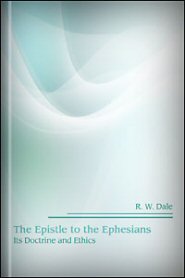
Arranged as a series of twenty-four lectures on doctrine and ethical standards introduced by Paul, R. W. Dale provides extensive commentary and clarification on the epistle to the Ephesians. Dale moves themetically through each chapter while offering stylistic clarification, detailed background on Ephesus, and the interpretation in each denominational doctrine.
The student who has carefully followed a good commentary on the Epistle to the Ephesians, cannot do better, if he desires to gain a harmonious view of the whole, than make himself acquainted with these admirable lectures. The terse and vigorous styles, rising on occasion to a manly and impressive eloquence, of which Mr. Dale is well known to be a master, gives lucid expression to thought that is precise, courageous, and original.
—Spectator
R. W. Dale (1829–1895) was educated at Springs Hill College, University of London, University of Glasgow, and Yale University. Dale primariliy pastored Carr's Lane Chapel from 1854–1895, and later went on to become Chair of The Congregational Union of England and Wales.
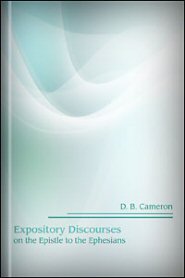
Originally prepared as a series of sermons, D. B. Cameron provides a comprehensive exposition of the Epistle to the Ephesians. Edited by Thomas Goodwin and Charles Hodge, Cameron explores the didactic exhortations found in Ephesians in an easy to understand manner.
D. B. Cameron was Minister of the Presbyterian Church in Acton, and a member of the Dundee School Board.
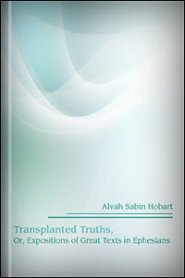
Combining discourse on stylistic analysis and general interpretation, the author expounds on key themes found in Ephesians. Relying on his knowledge of hermeneutics, Hobart provides a concise commentary that relates exegesis with Paul's particular writing styles.
This exposition of some of the great passages in Ephesians is an aid in understanding this great book. Mr. Hobart is the Professor of New Testament Interpretation in Crozer Seminary and handles his subject with the simplicity over-lying true knowledge, of which only the true student is capable.
—E. C. W.
The author of Tillage of the Heart and Seed Thoughts for Right Living is eminently simple and practical in work. This new volume is in helpful manner. It is an aid to understanding Ephesians, and a study in method of which many who would like to teach or preach may well avail themselves.
—Annual of the Northern Baptist Convention
Alvah Sabin Hobart (1847–1930) was educated to Hamilton Theological Seminary. Hobart went on to become Professor of New Testament Interpretation at Crozer Theological Seminary. He was renown for his mastery of biblical hermeneutics.
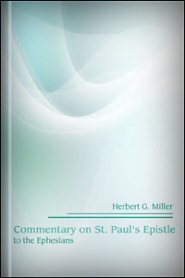
In Miller's Commentary on St. Paul's Epistle to the Ephesians, the author organizes his exposition of the text through key themes found in Ephesians. Miller examines the manifestation of divine inspiration, and provides connection between Ephesians and other New Testament books.
Herbert G. Miller was Minister of the church of Mt. Taber Presbyterian Church, NY.
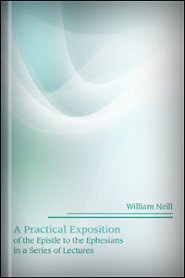
Arranged as a series of thirty-three lectures, William Neill expounds on key themes found in Ephesians including grace, salvation, the identity of Christ, spiritual gifts, and temperance in marriage. This commentary provides easily understandable exposition of a key piece of the New Testament.
There are more voluminous expositions of this Epistle; yet we believe the brief work before us will be both welcome and edifying.
—Biblical Repertory
William Neill was pastor of First Presbyterian Church from 1831–1842.
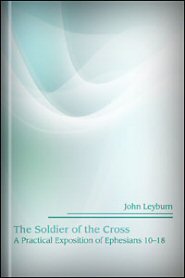
Focusing on Ephesians 6:10–18 on "The Armor of God", Leyburn gives extensive exegesis of each critical theme found in the excerpt. Arranged in twenty-two chapters, each spiritual theme receives generous elucidation and commentary.
This volume is an attempted exposition of that passage of the Epistle to the Ephesians, in which the apostle sets forth Christian duty under the figure of a warfare. The pasage is one capable of being illustrated, by a proper hand, with great interest and profit.
—New Englander and Yale Review
Dr. Leyburn has written an exposition of an exceedingly interesting portion of the Scriptures, in a manner that will be edifying to the general reader. The book gives sounds habits of thinking, a lively imagination, and a polished style. The topics in the chapter are exhibited with an amplitude of illustration and discussion that brings out their full and earnest meaning.
—The Presbyterian Magazine
John Leyburn (1620–1702) was educated at English College in Douai before becoming Vicar Apostolic of London in 1657.
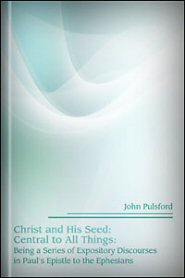
Beginning with a concise summary of the Ephesians, John Pulsford thoroughly examines the character traits and responsibilities given to believers in the book of Ephesians.
As a series of meditations on this Epistle, Mr. Pulsford's volume is exceedingly beautiful, suggestive, and edifying.
—The London Quaterly Review
The excellency of Mr. Pulsford is, that whether we accept or not his precise exposition, we must accept and benefit by his spiritual lessons. He has deep spiritual insight, tender human sympathies, and a bright, fervid faith in God's great and over-mastering love.
—The British Quarterly Review
John Pulsford (1815–1897) was Pastor of the Church of Edinburgh from 1856–1884.
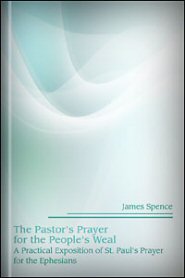
This concise volume represents an exposition of the prayer found in Ephesians 3:14–21, with regard to the blessing and hope bestowed upon the church at Ephesus. Spence contemplates the doctrine and power of prayer within an apostolic setting.
The piety, good sense, and spiritual tone of the volume will recommend it to all who may honor its page with a perusal, though we imagine it will be most prized by the congregation and immediate friends of the author.
—The Eclectic Review
James Spence was educated at The University of Aberdeen and Highbury College. Spence was later ordained and became Congregational Minister in Oxford. He published many works including The Religion of Mankind, Martha Dryland, and Scenes in the Life of St. Peter.
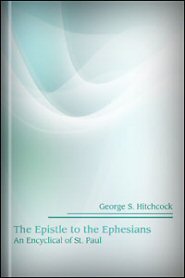
Covering the mission and unity of the church, the use of spiritual gifts, and the roles of relationships, George S. Hitchcock expounds on the critical themes displayed in Ephesians. Hitchcock creates a framework to examine the epistle's themes by verse-to-verse analysis and exposition.
An introduction of some fifty pages discusses the present and early interest in the Epistles—the writing, delivery, chronology, and encyclical character of the Epistle. This book will prove invaluable to the preacher or seminary professor.
—New Catholic World
George S. Hitchcock is the author of Sermon Delivery: A Method for Students and The Present State of Unitarianism.
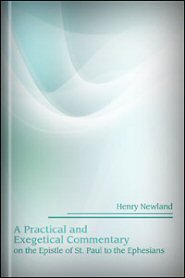
Henry Newland's A Practical and Exegetical Commentary on the Epistle of St. Paul to the Ephesians offers practical exegesis on the Epistle to the Ephesians. Dividing church history into the five periods of Persecution, Councils, School-men, Reformation, and Modern times, Newland discourses on the development and changes in doctrine over the periods.
Mr. Newland's design is to exhibit the Church's interpretation of this portion of Holy Scripture by a series of extracts from primitive, medieval, and modern commentaries, which he connects together by a running commentary of his own. In his well-written and thoughtful preface, he states and vindicates this principle of Church authority in the interpretation of Scripture.
—Notes and Queries: Medium of Inter-Communication for Literary Men, Artists, Antiquaries, Genealogists, etc.
Henry Newland (1804–1860) was educated at Corpus Christi College, Cambridge and Christ's College, Cambridge. Ordained in 1829, Newland later became Vicar of St. Mary Church in Devon and Chaplain to the Bishop of Exeter.
Reviews
4 ratings

M. David Johnson
3/27/2015

Larry Proffitt (I
11/13/2013

Bill Shewmaker
10/8/2013
Eduardo Vega
9/25/2013